
You’ve already experienced it… SEO is becoming harder and harder.
As time goes on, it takes longer to rank and you have to spend more money to get the results you want.
But the reality is, you can’t wait forever to get results. And you have no choice but to leverage SEO as a tactic because everyone else is doing it.
So, what should you do?
Well, the first thing you need to do is adjust how you think about SEO. SEO isn’t only about rankings. To be honest, I don’t even track them for my own site. It’s about getting the right kind of traffic.
You know, the visitors who are ready to buy.
So, instead of teaching you how to rank for competitive head terms, which is going to be even more difficult in 2019, I’m going to break down a formula that will give you much faster results and sales in this ultra-competitive environment.
And best of all, I am going to break it down into 4 steps as I know you don’t have the time to do everything.
Here’s the 4-step SEO strategy you should follow in 2019:
Step #1: Attract customers before they are ready to buy
The most expensive keywords to go after are buyer intent keywords. You know, the ones where someone types in a keyword and is ready to spend money right then and there.
And that will always be the case. Not just from an SEO standpoint, but even a pay per click standpoint.
So, what should you do… not go after these lucrative keywords?
Of course not. More so, you have to go after them no matter how long it takes to rank. You just have to be patient.
But in the short run, there are other keywords you can go after that aren’t as competitive and don’t cause a sale right away. But they do cause a sale to happen… it just takes a few weeks from when that person first lands on your site to when they buy.
So how do you find the keywords that aren’t as competitive and cause people to buy (as long as you are willing to be patient)?
You use Google Correlate.
Here’s how it works…
Let’s say you are selling beard oil but you know the term is competitive and will take you a lot longer to rank for than you have.
So what do you do?
With Google Correlate, it will show you all of the terms people search for in Google before they search for the term “beard oil.”
In other words, these are the same people who buy beard oil products… but now you are going to attract them to your site before they are even ready to buy.
Type in “beard oil” or the term you want to rank for in Google Correlate. Then, shift series to -2 weeks, which means you will be given a list of terms people search for 2 weeks before they are likely to type in “beard oil.”
And then you will get a list of terms:
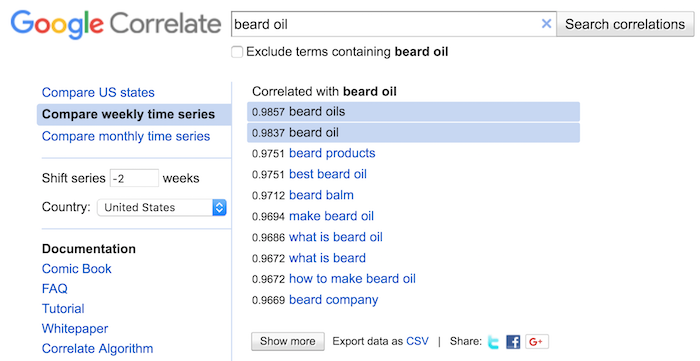
As you can see from the image above, people type in terms like beard products, best beard oil, beard balm, what is beard oil, and how to make beard oil.
If you write blog content that is super in depth about those phrases, you’ll appeal to people who also search for beard oil.
The cool part about Google Correlate is it works differently than Google Suggest or any other keyword tool because they are showing you what people search for before they are ready to buy.
And similar to how you put in -2 weeks as the shift series, you can turn it into a positive number and see what people search for weeks after looking up beard oil:
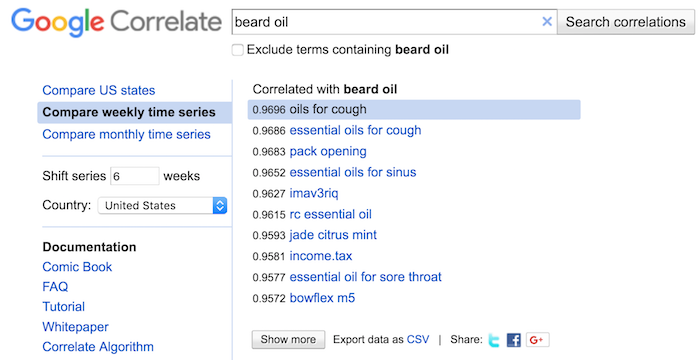
You’ll notice a lot of people who search for beard oil search for oils related to coughs.
Most people who sell beard oil probably don’t think about offering oils for coughing, but it is a similar audience and it’s a great way for you to generate extra revenue from the customer base you already have.
Step #2: Land and expand
Everyone focuses on ranking for new terms. But there is an issue, it’s hard to rank for new terms.
Even though SEO has a huge ROI, it’s a strategy that requires patience.
But here is the thing, you can get results faster if you use the land and expand strategy.
Here’s how it works. Log into Google Search Console. Next, click on “performance” and you will see a list of terms that you currently rank for:
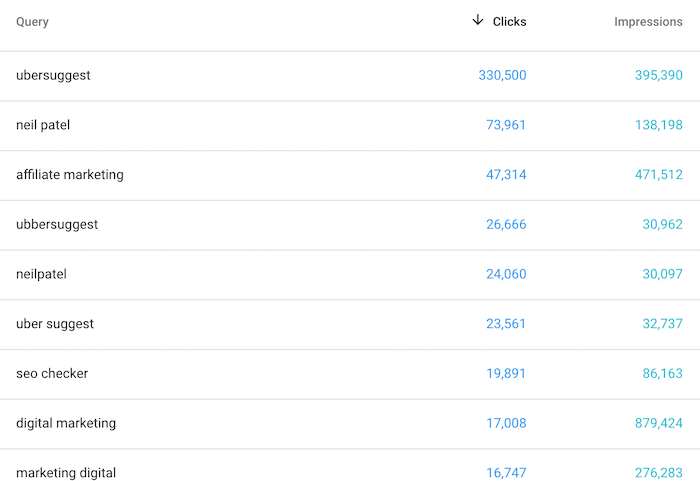
Then I want you to click on one of the most popular terms you already rank for and then click on pages. You should see a report that shows you the URL that ranks for the term on Google. You need this URL because you will be modifying this page.
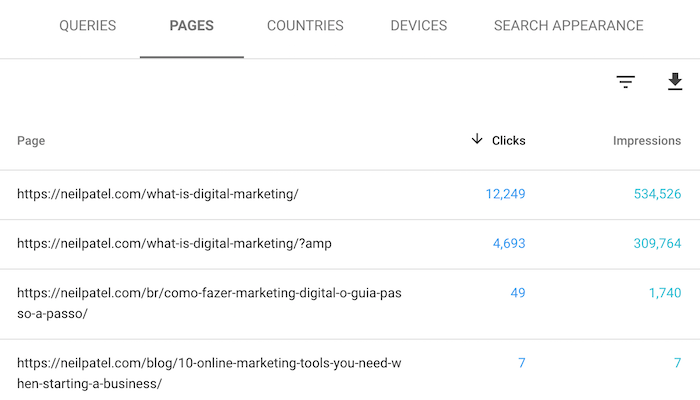
Now I want you to take that term and put it into Ubersuggest. Once the report loads, click on “Keyword Ideas” in the navigation. You’ll see a report that will look something like this:
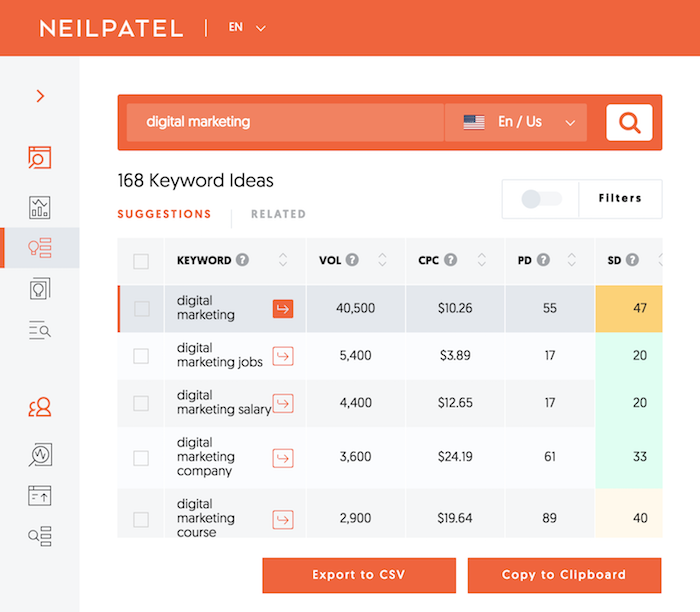
You’ll see a laundry list of long tail phrases… I want you to take the ones that are buyer intent related and add them to the page that already ranks for the head term.
When adding the long tail phrases, make sure you adjust your content to be relevant to those keywords. And pick the ones that are highly related to your product or service. Just stuffing them into your page without adjusting the content is spammy and won’t provide a good user experience to searchers.
What you will find is that because you are already ranking for the head term, typically you will shoot to page one within 30 to 60 days for the long-tail variation by adjusting your content. It’s a quick win!
But the key to this strategy is to pick the right longtail keywords. Don’t just look at traffic numbers, focus on terms that you know will cause a sale or a lead.
Step #3: Build a brand
Google has been placing more emphasis on brands. In other words, if you have a strong brand, you’ll rank faster.
When I really started focusing on brand building, my traffic went from 240,839 in June 2016:
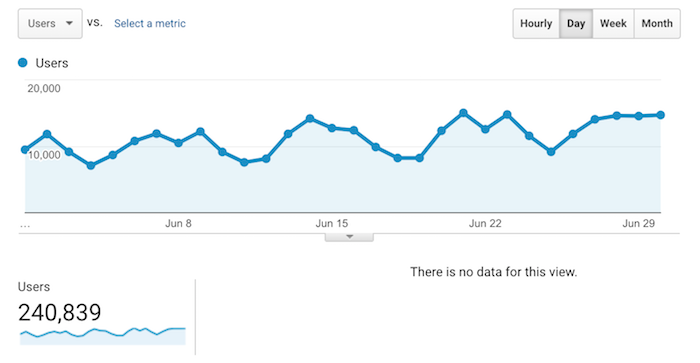
To 454,382 in August 2016:
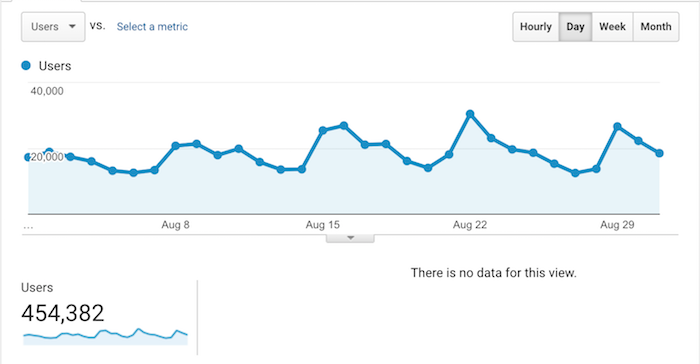
As the Ex-CEO of Google said:
Brands are the solution, not the problem. Brands are how you sort out the cesspool.
In other words, if you want to succeed on Google in the long run, you have to build a brand. As your brand grows, your search traffic will as well.
The way to monitor your brand growth is Google Trends. Type in your brand name into Google Trends as well as a few of your competitors to see how you are stacking up.

Sadly, there isn’t a quick hack to skyrocket your brand. There is, however, a formula that works for both personal and corporate brands.
So, what is the formula?
You do something that is bold!
Sure people can tell you to blog, speak at conferences, run ads… but none of that helps you build a brand that has a loyal following because everyone else is already doing the same things (or trying at least).
But what your competition isn’t doing is being bold. If you want a brand like Tony Robbins or Apple, bold is the way to go.
So how do you do something that is bold?
Well, lets first start with a personal brand (although I recommend that you build a corporate one instead).
Do the opposite
When it comes to building a personal brand, you’ll have to take the opposite approach of most people in your space. Whatever is working for them won’t work for you.
No one cares for the copycat, especially when they are satisfied with the original solution.
In other words, if you do exactly what your competitor is doing no one will care to follow you.
Let me give you examples of how to do the opposite of your competition:
- Genuinely help people – a lot of people blog and participate on the social web, but how many people take the time to respond to their community? As far as I can tell, less than 1%. Just look at me. For years, I’ve responded to comments on my blog, Facebook, and even YouTube. I am so engaged with my community on LinkedIn that they honored me as one of their Top Voices of 2018! Most people are too lazy to do this… doing the opposite has helped me build a connection with you. And if you are wondering why I do this it’s because when I started out I had no money and people helped me. I’m just trying to do the same.
- Writing 10x content – when I got into blogging, everyone was doing it. So I had to find a way to separate myself. I did this by writing in-depth guides… not those 5,000-word blog posts, I am talking about 30,000-word guides. On top of that, I spent money on the design so they would look beautiful.
- Creating video content – when I got into the digital marketing community, there were already large conferences that had thousands of attendees. I thought speaking at all of them would help my brand… and they did to some extent, but I was just another speaker. But very few people in my space were creating video content… so now instead of giving speeches at conferences, I give them on YouTube, Facebook, and LinkedIn. I’m able to reach more people without having to travel and the content lives on forever (and is available for free to everyone!).
That’s how I stood out from my competition and built a personal brand. And then I did it for years as brands aren’t built overnight.
If you aren’t sure on how to do the opposite of your competition when it comes to your personal brand leave a comment and I’ll try and give you some ideas.
Now let’s go into building a brand for your company… It all comes down to one thing…
Be bold
No matter what you are selling online you have competition. It doesn’t matter if you are a B2B or a B2C business… you have competition, which means it is going to be hard for your brand to stand out.
So, how do you differentiate yourself?
You do so by being bold.
Let me give you an example. In the United States, there are tons of options when it comes to cell phone carriers. So how do you stand out when everyone offers the same phone and competitive pricing?
Well, T-Mobile separated themselves by offering free Netflix, unlimited data, and free roaming.

And you don’t have to be a big company to do something bold. When Zappos started selling shoes they decided to do a few things different. First, they offered a refund policy that lasted 1 year. Just think about that… if you return a shoe to them 12 months later, the chances are it’s out of style and they won’t be able to resell it.
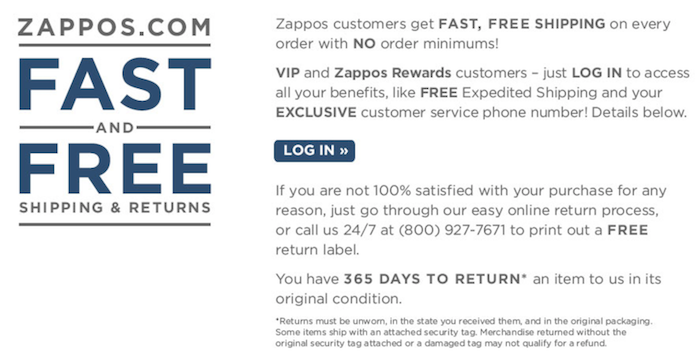
Then they decided to randomly upgrade their shipping. So instead of ground shipping, they would randomly upgrade you to 2-day or next-day air.
And Amazon crushed their competition the moment they rolled out their Prime program. When it first came out, you would get free 2-day shipping on all Prime products for just $99 a year. What a ridiculously amazing offer.
Now that’s being bold!
Being bold doesn’t have to break your bank account. You don’t have to do something like Amazon and T-Mobile… it can be as simple as providing amazing customer service when you are in an industry that’s known for terrible support.
If you are unsure of how you can be bold with your business, leave a comment and I will try and give you some ideas. Make sure you provide an overview of your business so I can give you halfway decent ideas. 😉
And of course, being bold won’t build your brand overnight (it takes years) but you should see growth each quarter. If you aren’t, that means you aren’t being bold enough.
Step #4: Build a better mousetrap
A mousetrap? Why would you want to build a mousetrap?
Link building is still important. Sure, Google is looking at many other factors now, but link building still helps with rankings.
But it is harder to build links than it used to be back in the day. Everyone is blogging… heck, there are over 440 million blogs and over a billion if you count Tumblr, Medium, and WordPress.com.
Yes, that means there are more sites to hit up and ask for a link but everyone is doing that.
So how do you build links when everyone is getting those spammy emails asking for a link, such as the one below?
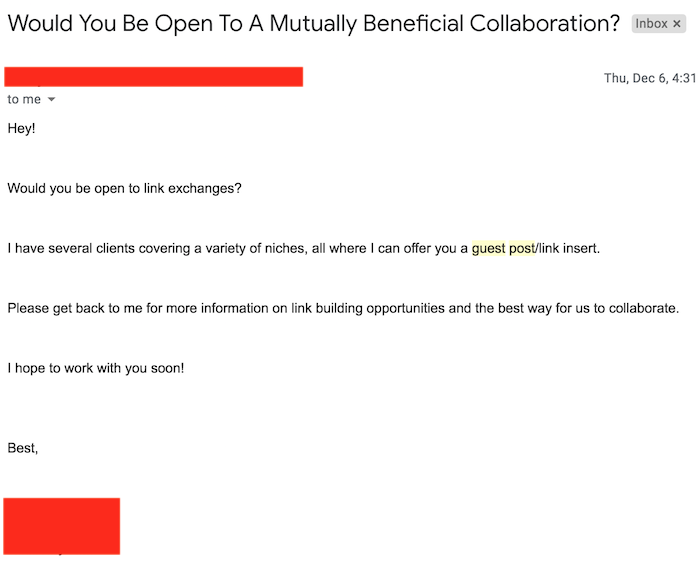
You have to build a better mousetrap. Something so amazing that everyone wants to link to it without you asking for a link.
It used to be detailed guides but seeing 10,000-word guides that have fancy designs are more common these days than when I started creating them.
They still work, especially when it comes to brand building, but they just aren’t as effective when it comes to link building.
Same with infographics, they used to get tons of social shares and links (they still do to some extent), but they aren’t as effective as they used to be.
So what kind of mousetrap do you need to build? You could start off with something that people are used to paying for.
For example, the consulting firm Price Intelligently released a free analytics software called ProfitWell.
With very little marketing, they were able to generate 943 backlinks from 187 domains.
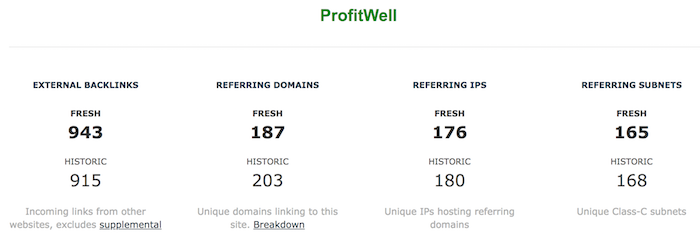
I also did this with Ubersuggest.
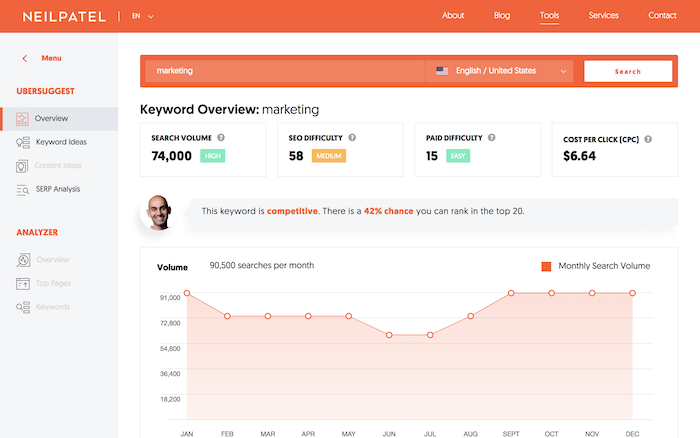
I put in more effort into marketing, so I was able to generate 10,667 unique backlinks.
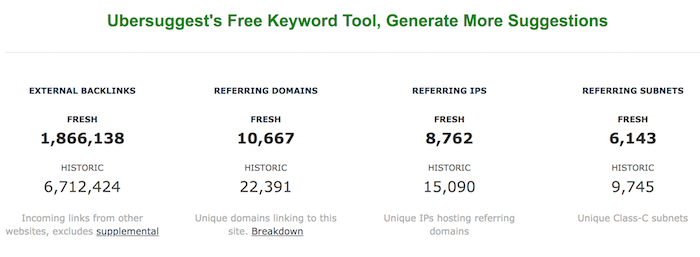
A great example in the consumer space (this would do wonders for e-commerce sites as well) is animated infographics. Everyone has seen infographics, so Aminagraffs decided to make their infographics animated, which caused them to go viral.
Here’s part of their infographic that breaks down how a car motor works.
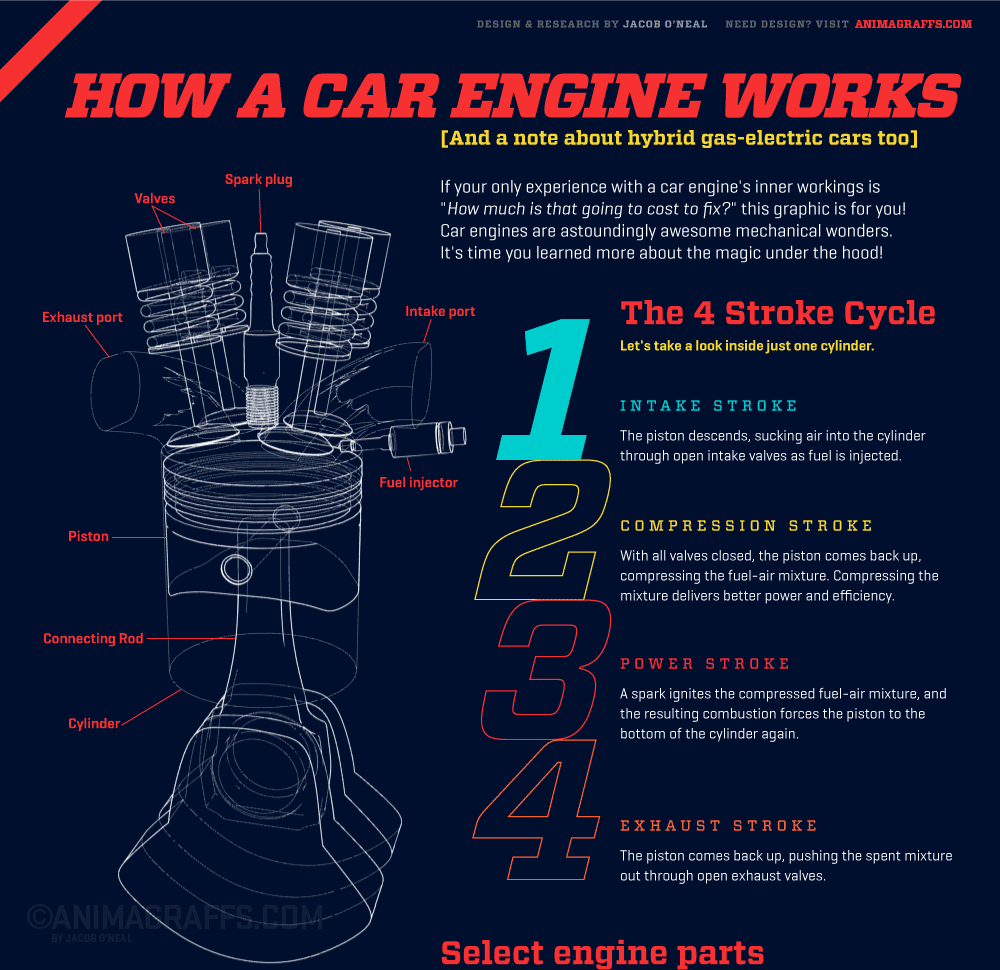
Best of all, the Amimagraphs founder didn’t do any marketing… the graphic just spread. Even with no marketing, it generated 751 backlinks from 136 domains and over 200,000 visitors.
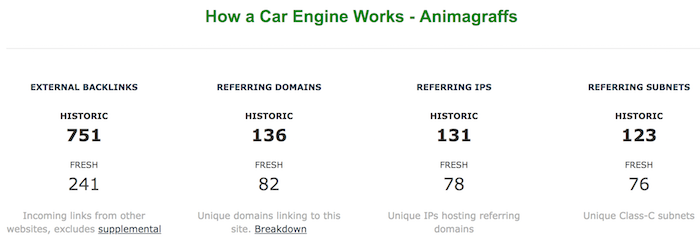
If you want to use old-school link building tactics, you can, they just won’t help you as much in 2019. So, get creative and build a better mousetrap.
When you build a good mousetrap, you may be worried about cost. But there is a different way to think about it…
How much would you be spending on marketing to get the same results?
People make fun of me for what I am doing with Ubersuggest and think it is silly that I can “lose” $150,000 or so a month. But if I had to buy the traffic that I get because of Ubersuggest it would cost me much more than $150,000. Even though my mousetrap is expensive, it is still cheaper than paid ads.
And you don’t have to go as far as me. Doing what Animagraffs is affordable. I paid them $750 to create an animated infographic for me. I’m not sure what they charge these days, but I bet you can find someone on the web who will do it for a few hundred bucks.
Conclusion
Instead of thinking of SEO in the traditional sense, I want you to shift your strategy.
SEO is only going to get harder, Google is going to continually change their algorithm in ways you may not like, but the one thing that is certain is the old way of doing SEO will get you results, just not in the timeframe you want.
So, follow the 4 steps above. They are unconventional, but the industry is so competitive and saturated that you have no choice but to think outside of the box.
So what other unique strategies are you going to leverage in 2019?
The post How to Dominate Google in 2019 appeared first on Neil Patel.
from Blog – Neil Patel https://ift.tt/2GbjPms

No comments:
Post a Comment